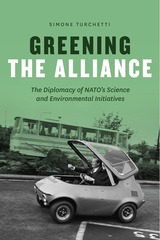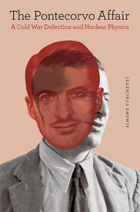2 books about Turchetti, Simone

Greening the Alliance
The Diplomacy of NATO's Science and Environmental Initiatives
Simone Turchetti
University of Chicago Press, 2018
Following the launch of Sputnik, the North Atlantic Treaty Organization became a prominent sponsor of scientific research in its member countries, a role it retained until the end of the Cold War. As NATO marks sixty years since the establishment of its Science Committee, the main organizational force promoting its science programs, Greening the Alliance is the first book to chart NATO’s scientific patronage—and the motivations behind it—from the organization’s early days to the dawn of the twenty-first century.
Drawing on previously unseen documents from NATO’s own archives, Simone Turchetti reveals how its investments were rooted in the alliance’s defense and surveillance needs, needs that led it to establish a program prioritizing environmental studies. A long-overlooked and effective diplomacy exercise, NATO’s “greening” at one point constituted the organization’s chief conduit for negotiating problematic relations between allies. But while Greening the Alliance explores this surprising coevolution of environmental monitoring and surveillance, tales of science advisers issuing instructions to bomb oil spills with napalm or Dr. Strangelove–like experts eager to divert the path of hurricanes with atomic weapons make it clear: the coexistence of these forces has not always been harmonious. Reflecting on this rich, complicated legacy in light of contemporary global challenges like climate change, Turchetti offers both an eye-opening history of international politics and environmental studies and a thoughtful assessment of NATO’s future.
Drawing on previously unseen documents from NATO’s own archives, Simone Turchetti reveals how its investments were rooted in the alliance’s defense and surveillance needs, needs that led it to establish a program prioritizing environmental studies. A long-overlooked and effective diplomacy exercise, NATO’s “greening” at one point constituted the organization’s chief conduit for negotiating problematic relations between allies. But while Greening the Alliance explores this surprising coevolution of environmental monitoring and surveillance, tales of science advisers issuing instructions to bomb oil spills with napalm or Dr. Strangelove–like experts eager to divert the path of hurricanes with atomic weapons make it clear: the coexistence of these forces has not always been harmonious. Reflecting on this rich, complicated legacy in light of contemporary global challenges like climate change, Turchetti offers both an eye-opening history of international politics and environmental studies and a thoughtful assessment of NATO’s future.
[more]

The Pontecorvo Affair
A Cold War Defection and Nuclear Physics
Simone Turchetti
University of Chicago Press, 2012
In the fall of 1950, newspapers around the world reported that the Italian-born nuclear physicist Bruno Pontecorvo and his family had mysteriously disappeared while returning to Britain from a holiday trip. Because Pontecorvo was known to be an expert working for the UK Atomic Energy Research Establishment, this raised immediate concern for the safety of atomic secrets, especially when it became known in the following months that he had defected to the Soviet Union. Was Pontecorvo a spy? Did he know and pass sensitive information about the bomb to Soviet experts? At the time, nuclear scientists, security personnel, Western government officials, and journalists assessed the case, but their efforts were inconclusive and speculations quickly turned to silence. In the years since, some have downplayed Pontecorvo’s knowledge of atomic weaponry, while others have claimed him as part of a spy ring that infiltrated the Manhattan Project.
The Pontecorvo Affair draws from newly disclosed sources to challenge previous attempts to solve the case, offering a balanced and well-documented account of Pontecorvo, his activities, and his possible motivations for defecting. Along the way, Simone Turchetti reconsiders the place of nuclear physics and nuclear physicists in the twentieth century and reveals that as the discipline’s promise of military and industrial uses came to the fore, so did the enforcement of new secrecy provisions on the few experts in the world specializing in its application.
[more]
READERS
Browse our collection.
PUBLISHERS
See BiblioVault's publisher services.
STUDENT SERVICES
Files for college accessibility offices.
UChicago Accessibility Resources
home | accessibility | search | about | contact us
BiblioVault ® 2001 - 2024
The University of Chicago Press









